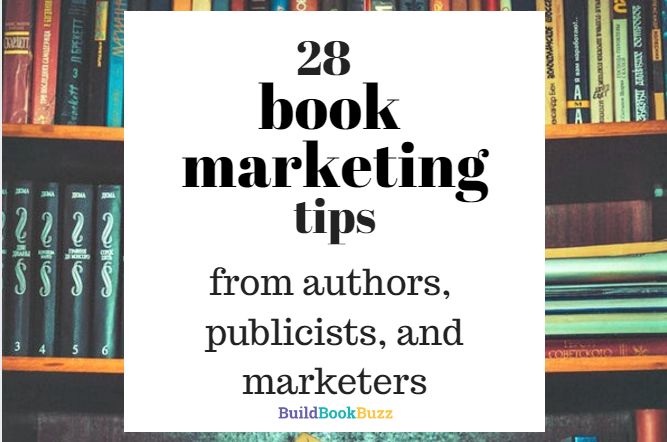28 book marketing tips from authors, publicists, and marketers
Most authors who are serious about writing good books and selling more of them turn to a few favorite and trusted sources for book marketing tips and advice.
That’s smart. After all, it takes time to figure out who you can trust.
Every once in awhile, though, it’s nice to look past your inner circle to test your thinking or to learn from the experiences of others.
That’s why I decided to reach out to strangers for this roundup of book marketing, promotion, and publicity tips.
I used my Build Book Buzz Facebook group and “Help a Reporter Out” — HARO — to ask authors, publicists, and marketers to send me their best book marketing tip. (HARO links journalists with expert and other sources. If you subscribe to HARO, be sure to download my free “How to Respond to HARO Requests” cheat sheet to make sure you get interviewed or quoted.)
Book marketing tips
Here are their responses in their own words (I’ve edited only for style and length). They’re listed in alphabetical order.
Is there an “aha!” or two in here for you?
 Maggie Aland, Fit Small Business
Maggie Aland, Fit Small Business
Create a blog and write informative, interesting, or entertaining articles related to the subject of your book.
Even in today’s digital age, people love reading books. However, the format of how people digest informative and entertaining content has shifted. In a given day, we are way more likely to read a shorter form article that our friend posted on social media than a physical book.
So reach people where they are! By writing a blog post and sharing it on platforms such as Facebook and Twitter, you are able to reach a ton of people who may be interested in reading your post. Your blog should have a similar tone, writing style, and subject as your book. Therefore, people who like your article may (a) realize you’re an author and be interested in purchasing your book, or (b) share your article and spread the word about your writing. Plus, if you have a re-targeting pixel on your blog, you can re-target users who read your post on third party platforms (such as Facebook).
 Rachel Anderson, RMA Publicity
Rachel Anderson, RMA Publicity
Don’t focus all of your promotional attention on social media. Pursue traditional media opportunities as well.
When you or your book are featured in your hometown newspaper, or interviewed by a local radio or TV station, it can pay huge dividends when it comes to book sales. A media appearance will set you apart from all the other authors out there vying for attention. Plus, depending on what community you live in, being featured by the news media could expose you to thousands or hundreds of thousands of potential customers at the same time. And when your story is featured in the news media, it gives you instant credibility.
 Lisa Barone, Overit
Lisa Barone, Overit
Build your promotion platform before you need it.
If you thought writing the book was hard, get ready to promote and market it! Getting the word out about your newly-released book is hard. Authors can greatly increase sales by building their audience and promotional platform before they need it.
Build your platform on something you own – your website, blog, an email list, etc. Use it to connect with the type of people your book wants to attract. Start sharing content related to your niche or expertise. Be someone they can trust and the person they look to. Earn their eyes before you ever have something to market to them. Give them glimpses into what you’re working on and build excitement around it. By building trust around you who you, and buzz around what’s coming, you’ll be in a better position to market your book once it’s available.
 Susan Daffron, Author
Susan Daffron, Author
Write the next book.
Whether fiction or nonfiction, it’s much easier to market a series of books, rather than just a single title. If you write novels, write a series that is tied together in some way. If you write nonfiction, write multiple books on related topics that promote your expertise. By targeting a single audience, your marketing can be more focused than if you’re scattering your efforts across a wide range of readers. If you continue to produce the type of books your audience wants, you also will find it easier to market your books over time because you can market to existing customers instead of having to find new ones.
 Nandita Godbole, Author
Nandita Godbole, Author
Don’t sell, but tell.
In terms of marketing an upcoming title, authors (myself included) feel compelled to tell potential readers what the book is about in the first five minutes. As storytellers, we feel the need to tell-it-all for fear of losing their interest – and we actually do end up losing their readership. But a reader must discover the complexity of our characters all on their own time and pace in order to fully appreciate and enjoy the narrative, to feel uplifted or hurt along with our hero or heroine, to cry and rejoice with them at every turn of the story. The story has its own life.
The best way to recondition our storyteller instinct is to think about a book backward. If we are to classify it, what is the best place to find that book? In addition, where would we place our book so that a new/unique reader may find it? Is it in the romance, self-help, sci-fi, or in the parenting section? If it is there, is it likely that someone else will recommend the book?
A finished book represents your subject and the deep-seated motivation to write that particular story. Tell your readers that story. Readers who connect to that story will be sold on your book, and all you had to do was “tell” them.
 Cory Groshek, Manifestation Machine
Cory Groshek, Manifestation Machine
Distribute copies of your paperback or hard cover book into little free libraries.
Little free libraries are little boxes, which, in most cases, resemble small schoolhouses on poles and can be found in neighborhoods seemingly everywhere, including, most likely, one near you. They are an excellent place for you to drop a physical copy of your book for others to read.
Going by the motto “take a book, return a book,” the idea is that readers from whatever neighborhood the little free library is in will pick up your book and either bring it back when they’re done reading it (so someone else can read it) or leave another book in its place. Either way, with this extremely underutilized “guerrilla” book marketing technique that most authors don’t even know about, you, as a relatively unknown author, win. So the next time you’re thinking up ways to promote your work, rather than thinking “outside the box”, perhaps you should try thinking inside of it, as in, inside of a little free library (or 10) near you.
 Laura Hall, Shiply
Laura Hall, Shiply
Create a blog and expand on the story.
We all know how to use a book and we can all look at the front cover (which you’re not supposed to judge!) so the best way to market a book is to show what it feels like to read, and what happened as a result of reading it. I would suggest that the author has a blog, so they can expand on the issues or topics raised in the book, making it more than just the object. Is your book about something like love and relationships? Talk more about that. It’ll show that your book is more than just a product, but a place where people can learn and find answers. There is always more to a story than the book in your hand.
 Janet Heller, Author
Janet Heller, Author
Do personal appearances and promote them.
Libraries, schools, conferences, and bookstores often sponsor readings, panels, workshops, and bookfairs for authors who live nearby. Also, local media will cover writers who have such events, so contact media with a press release as soon as you have all of your event details: the location, time, cost of admission if any, website of the sponsoring organization, contact person for questions, etc. At libraries, schools, and bookstores, you will meet people who can help you to plan other events, such as teachers, scout leaders, and other writers. Consider doing a group reading or panel with other writers and/or artists to draw a larger audience.
 Phyllis Heller, Heller Media Solutions
Phyllis Heller, Heller Media Solutions
Identify what makes you newsworthy.
Everyone has expertise in some area. Figure out what you can talk about that other people can’t. Offer a perspective that isn’t easily accessed. Research where authors with similar backgrounds have gotten exposure and figure out what you bring to the conversation. Even if you are a novelist, you picked your characters for some reason. Do you have in depth knowledge of some topic in your novel? Use it to start a dialogue.
 Shel Horowitz, Author
Shel Horowitz, Author
Own your own channel.
Yes, you want a social media presence. But remember that any social media network you don’t own can yank the rug out from under you at any time, for any reason. They’ve done it before. If someone reports your content as spammy, or if they encourage you to go deep with a technology and then stop supporting it (as Facebook did years ago with FBML), or if they simply dry up and become irrelevant (as MySpace did), you lose your entire marketing machine if all your eggs are in that basket.
Buy your own well-named domain and put up a simple website there. Use your social media pages not just to interact with people, but to drive them to sign up for your newsletter (which you send at least monthly), visit your site, and become part of a community you can control. Giveaways, author interviews, and other perks are some of the ways you can do that.
 Hilary Jastram, J. Hill Marketing and Creative Services
Hilary Jastram, J. Hill Marketing and Creative Services
Start marketing well before the publish date.
You can build what’s known as an affinity network, meaning, the purpose of this group is solely to support your aims—in this case marketing your book. Your network will promote your book (likely in exchange for you helping them in some agreed-upon fashion) and use the power of many close collaborators to influence sales.
A network makes for easier communication, and it allows people to perform at once. People buying in sync, people blasting out your book message at once — it is truly amazing what a persistent team can accomplish, whether it be to push your pre-orders, rocket you to best-seller status or simply sell more books. Start your marketing at least three months in advance. Rally your troops up into a froth and come publishing day, you will create serious engagement.”
 David Johnson, Strategic Vision PR Group
David Johnson, Strategic Vision PR Group
Remember to mention the title of the book during interviews.
That is the number one mistake many authors make and it hurts the purpose of the interview as many listeners and viewers may only catch a portion of the interview and miss the title of the book being discussed which means a loss of sales.
 Eric Johnson, Feedback Wrench
Eric Johnson, Feedback Wrench
Don’t underestimate the power of online reviews.
While most authors have heard over and over again that they need to rack up online reviews on sites like Amazon and Google, few actually know why the effort is necessary. What’s obvious is that positive reviews convey trust to other readers and make them more likely to buy your book. What’s not so obvious is that, much more importantly, the same kind of trust is conveyed to search engines, not just consumers.
When people search for books in your genre, does your name come up on Google, Amazon, or Bing? Search engines are always on the hunt for both trustworthiness and relevancy. By obtaining more and more reviews from satisfied readers, your book will be moving closer and closer to the top, and you’ll land more sales as a result of it.
 Elliott Katz, Author
Elliott Katz, Author
Sell foreign rights for your book.
It brings in additional revenue. It helps you change the world by getting your book’s messages to people who don’t read English. It gives your book more credibility in the English language market when you can say, “Translated into seven languages.”
 Brad Lemack, Lemack & Company Talent Management/Public Relations
Brad Lemack, Lemack & Company Talent Management/Public Relations
Don’t think big! Think smart.
Most books have a very specialized demographic. Focus on that. Don’t waste time, money, and expectation energy trying to sell your book, your topic, to the world. Find where your audience is and go after them where they “hang.” In short, selling more copies of your book to the audience it’s written for spells success. Don’t reach for The New York Times when Popular Mechanics will do.
 Phyllis Zimbler Miller, Miller Mosaic
Phyllis Zimbler Miller, Miller Mosaic
Focus your social media time.
For effective book marketing (unless you have a huge marketing budget and a dedicated marketing staff) it is best to concentrate on a limited number of social media and marketing platforms. As a book author you need time to write, and if you spend hours a day trying to populate numerous sites with marketing your book, you will probably spread yourself too thin to be effective on any of these sites.
Choose the social media sites (and this includes participating on Amazon) that make the most sense for your personality and time commitment. Then share good content of your own and that of others to encourage people to connect with you on social media and re-share your updates.
 Andrea Pass, Marketing Maven
Andrea Pass, Marketing Maven
Reach target audiences via traditional public relations and social media platforms.
Print and online reviews should be part of that public relations mix. Take all interviews and reviews and include that on the book’s website and social media pages for maximum effect. When handling public relations outreach, do not send mass mailings of the book. Carefully reach out to reviewers and guest bookers to gather their interest so that they are expecting to receive the book. Start outreach a few months before the book will be on store shelves.
 Rhonda Rees, Rhonda Rees Public Relations Company
Rhonda Rees, Rhonda Rees Public Relations Company
Be pro-active with your PR and media coverage.
Posting the information to your website, blog, Facebook, Twitter or LinkedIn page, and on other social media is a definite plus. Showing streaming videos, audio, and having print articles on display is what good PR is all about. You can’t expect that people will notice your coverage the first time around. It’s always a cumulative effort, and by targeting your media so that more people will eventually see it, is a good idea.
Sending out your coverage through direct mail, or electronically, or even by distributing materials at events is also smart way to go. You can reprint a magazine article for example, and put your contact information on it with a QR code leading them to your book. You can also print up postcards or flyers with this same information to distribute, or to have on hand. One good tip to say is, “As seen on XYZ.TV station” or “As heard on radio station XYZ…”, and people will be impressed.
 Becky Robinson, Weaving Influence
Becky Robinson, Weaving Influence
Plan ahead and show up.
Don’t wait until a month or two before your book is released to begin building a community for your work and expect people to jump onboard. Start at least six months to a year in advance by creating a professional website as your unique online home, provide valuable content by blogging consistently, engage on social media, support the work of others, and build a permission-based email list. Everyone likes to feel like they have the inside track on the next big thing, so let them become an insider to your launch and include them in the success.
The best way to promote your book is for other people to talk about it. Word of mouth marketing is one of the most powerful tools out there, and often the difference maker between a best seller and a dud. Never underestimate the power of social sharing and community involvement – both of which require proactive planning and participation.
 Boni Satani, Zestard
Boni Satani, Zestard
Build an email list.
If you have an email list, you have an audience who believes in your ideas and are ready to buy when the book releases.
 Len Saunders, Author
Len Saunders, Author
Go out into the public with your book.
Try to visit schools, camps, libraries, or book stores and offer a book reading or signing of your book. For many, getting the word out about your book is difficult. I know when my first book came out, I was fortunate to get on “Good Morning America” and “Fox News.” But, this did not happen with every book I have written. But, I remember getting the word out about my book at a camp which led to over 500 sales in one day. If you are a lesser-known author, stay local and offer the reading or signing for free. Have a prepared presentation and keep your audience engaged.
 Jyssica Schwartz, Author
Jyssica Schwartz, Author
Share your process.
Tell other people that you’re writing a book. Answer questions about it, talk to people, ask about ideas or their opinions. Have them vote on different cover options. For one thing, it will keep you accountable for actually writing and completing your book. But more than that, people will feel involved and invested in your book and in you.
When you do actually publish your book, those people will be happy to do reviews for you and excited for you. They will share it on social media and recommend it to others and encourage people to purchase it. Building a tribe and an email list of people who are already rooting for you will allow you a further reach than you can get on your own.. And that’s before any money is spent on advertising, giveaways, promotions, anything.
 Janet Shapiro, Smith Publicity
Janet Shapiro, Smith Publicity
Use an integrated, multidimensional marketing approach and ideally begin at least three months ahead of publication.
The most successful book launches begin well in advance of publication date. Ideally, three to six months ahead of publication an author should start building awareness around himself and the pending book. It is critical to have: a solid website that is informative and useful for visitors, and promotes the book and author; a strategic media outreach program in place designed to hit key influencers; and two or three social media platforms ready to enhance and cross-promote all interest. The top online and print review publications require an advance review copy at least four months ahead of publication.
The other advantage to a pre-launch marketing plan is the ability to present articles and excerpts to online media and influencers to begin, or enhance, credibility and momentum. Social media, both pre and post pub date, rounds out the plan and enhances the buzz. It’s typically never too late, however. If you haven’t started ahead of your book release date, begin promotion by identifying your target end-user (book-buyer) market, and the media which cater to this market, and then roll-out pitching to these outlets.
 Joan Stewart, The Publicity Hound
Joan Stewart, The Publicity Hound
Become a subject matter expert in your topic or niche, even if you write fiction. Promote your expertise first and your book second.
Authors sell books. Author experts sell books, speaking engagements, consulting, coaching, and more. They also get requests for media interviews. Just look at the number of HARO media queries that use the word “expert.”
If you’re not an expert yet, choose the main topic of your book, or a sub-topic that doesn’t have a lot of competition with other experts. Spend 30 minutes a day researching. Expertise isn’t only about what you know. It’s more about what you do with that knowledge. Experts teach, blog, podcast, create, and share compelling content, answer questions, start conversations online, and more.
 Brianna Valleskey, Brave Ink
Brianna Valleskey, Brave Ink
Use influencer engagement and content marketing.
Find people who have a large following on their blog, social media account, or YouTube channel and offer to send them a free copy to review. Make sure that the topic of your book relates to what the influencer typically posts about (i.e. a fashion blogger is not likely to review a book about financial markets).
Always be courteous and helpful when interacting with influencers. Remember that they work for themselves, not you. From a content marketing perspective, you can publish excerpts of your book on your blog – or even write original posts about a similar topic and then link to a place where people can purchase your book. You can also reach out to popular related blogs and offer to guest post an excerpt or write an original post that would link back to your book. The more you can position yourself as a thought leader in the industry you’re writing for, the better engagement you’ll get for your book.
 Ame Verso, F+W Media International Ltd.
Ame Verso, F+W Media International Ltd.
Craft your Amazon author page.
The Amazon author page is a powerful marketing tool as evidence suggests that the Amazon algorithm favours books with a complete and updated author profile over one that doesn’t. You should therefore update your author page as frequently as you do your website and make sure that any new books you publish are linked to it. You’ll need to set up an author page through Amazon Author Central separately for Amazon.com and Amazon.co.uk – something many authors fail to do, focusing only on their local market. Ensure you have as complete a profile as possible including a headshot, biography, – Amazon.co.uk will even let you upload videos and display your Twitter feed, helping you to grow your platform across multiple channels.
 Andrew Warner, Content Ranked
Andrew Warner, Content Ranked
Build your fanbase before the release.
If you have a new book (or even if it’s your first book), it doesn’t hurt to build a little fanbase around your book well before the release. This will help out drastically when it comes to the marketing side of it because that fanbase will be doing a lot of the promoting for you. To build your fanbase, and if you have a website, you could hold contests or various writing prompts that’ll really involve your readers. To take it further, you could create a special Facebook group of ambassadors for your book that’ll help get the initial word out.
 Sherrie Wilkolaski, Publishing Architect
Sherrie Wilkolaski, Publishing Architect
Market by networking.
It seems a bit “old-fashioned” in the digital age we’re living in, however, given the propensity for everyone trying to connect only via social media, the impact can be monumental. Identify a local writer’s group that suits your genre and get involved. The education an author can get just by having a few conversations with writers already established in the same space is invaluable. Writers enjoy helping other writers get through the muck that is book marketing and PR.
Opportunities to cross-promote your work will be plentiful. Things like offering to doing guest blog posts on another author’s site, sharing their book excerpts to your audience, and announcements about local book signing events, will be plentiful. The “meeting in person” relationships are sure to extend into the digital space, but will have a stronger foundation. It will make those social media posts and online promotional messages even more valuable.
Now that you’ve learned so much from these experts, you’re ready to start thinking about your book marketing plan. Start by downloading the free Build Book Buzz “Book Marketing Plan Template.” This easy-to-use fill-in-the-blanks form comes with complete instructions for filling it out — along with examples to guide you.
All you have to do is click the blue bar below to get your free copy immediately.
What’s your best book marketing tip? Please share it in a comment.
Like what you’re reading? Get it delivered to your inbox every week by subscribing to the free Build Book Buzz newsletter. You’ll also get my free “Top 5 Free Book Promotion Resources” cheat sheet immediately!


Work closely with your publisher. Share the chores, be active, and let them know what you are up to. This is both courteous to someone helping you, and also practical. If your publisher is big, you don’t want to get lost in the pile, and an update on your activities reminds them you are alive. If your publisher is small, they may be encouraged by your efforts– and may surprise you in a positive way.
For instance, my last book, “STEM CELL BATTLES” was originally intended to have only black and white illustrations– but when I opened the pages of the first copy, to my delight it was in full color throughout. Whenever I think of World Scientific Publishing, Inc., I will remember that Technicolor surprise.
Would it have happened if I had not worked hard on the promotion and kept my editor informed? Maybe. But for me, the publisher is a friend forever, someone fighting by your side to advance your mutual goals.
Excellent tip, Don! Thanks!
I always advise authors with a traditional publishing contract to ask the in-house publicist what the publisher will be doing to support the launch. That way, the author can be certain to supplement, rather than duplicate, the publisher’s efforts. You really want to collaborate. What do they do best? What do YOU do best? Each should focus on its strengths, but you need a conversation about the marketing plan for this to work.
Thanks!
Sandy
Thanks to Sandra and all the authors who shared their valuable advice.
I especially like:
“Don’t waste time, money, and expectation energy trying to sell your book, your topic, to the world.”
and
“Tell other people that you’re writing a book. Answer questions about it, talk to people, ask about ideas or their opinions. Have them vote on different cover options.”
A targeting pixel sounds intriguing, but might be beyond the expertise of many technophobes.
Thanks, Kathy. There are so many gems in here! I’m glad you found it useful.
Sandy
Dear Sandra Beckwith,
Thank you for including my advice in this article. You have many good ideas here for people who have books to market.
Best wishes!
Sincerely,
Janet Ruth Heller
Author of the award-winning book for children about bullying, How the Moon Regained Her Shape (Arbordale, 2006; 4th edn. 2014), and the middle-grade book for kids The Passover Surprise (Fictive Press, 2015).
My website is http://www.janetruthheller.com
Thanks for your contribution, Janet!
Sandy
There are some great tips here. Another tip–for those of you who write nonfiction and have limited budgets–is to go after radio interviews. It is much easier to get on talk radio than it is to book TV appearances or get publicity in major newspapers or magazines. Check out http://www.radiopublicity.net and other options, compare the prices, and see what gives you the most bang for the buck.
Thanks, William. In the interest of transparency, friends, William has linked to his own site, where he sells a list of radio stations. It’s a lot easier than compiling your own, believe me.
Sandy